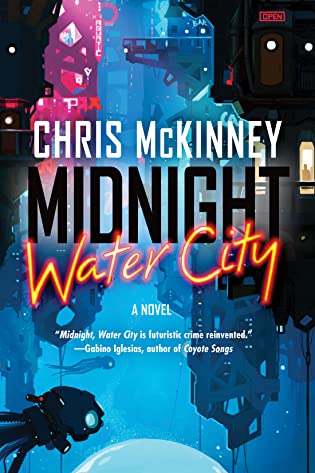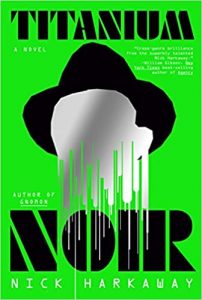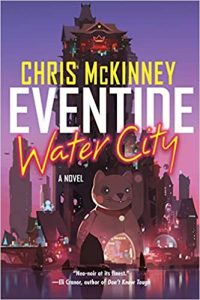 Midnight, Water City (Water City, #1) by Chris McKinney
Midnight, Water City (Water City, #1) by Chris McKinney Format: eARC
Source: supplied by publisher via Edelweiss
Formats available: hardcover, paperback, ebook, audiobook
Genres: mystery, noir, post apocalyptic, science fiction, thriller
Series: Water City #1
Pages: 305
Published by Soho Crime on July 13, 2021
Purchasing Info: Author's Website, Publisher's Website, Amazon, Barnes & Noble, Kobo, Bookshop.org, Better World Books
Goodreads
Hawai‘i author Chris McKinney’s first entry in a brilliant new sci-fi noir trilogy explores the sordid past of a murdered scientist, deified in death, through the eyes of a man who once committed unspeakable crimes for her.
Year 2142: Earth is forty years past a near-collision with the asteroid Sessho-seki. Akira Kimura, the scientist responsible for eliminating the threat, has reached heights of celebrity approaching deification. But now, Akira feels her safety is under threat, so after years without contact, she reaches out to her former head of security, who has since become a police detective.
When he arrives at her deep-sea home and finds Akira methodically dismembered, this detective will risk everything—his career, his family, even his own life—and delve back into his shared past with Akira to find her killer. With a rich, cinematic voice and burning cynicism, Midnight, Water City is both a thrilling neo-noir procedural and a stunning exploration of research, class, climate change, the cult of personality, and the dark sacrifices we are willing to make in the name of progress.
My Review:
When Chicken Little claimed that the sky was falling, that chicken faced a LOT of skeptics – and rightfully so. When the irascible, charismatic, genius Akira Kimura claimed pretty much the same things at the end of the 21st century, the science behind her claim was just a bit more complicated.
Not that there still weren’t PLENTY of skeptics. That’s human nature – especially in the face of a world-ending catastrophe that is still years away.
But Kimura had a stellar scientific reputation to bolster her claim. More importantly, even as she proclaimed that the world was about to end, she also claimed to have the solution. So governments and corporations threw money and power at her so that she could save the world from an onrushing meteor.
She did save the world. Forty years later, Earth is a much better place than it was before its near-collision with the asteroid Sessho-Seki. As much fun and excitement as stories about preventing disasters and saving the world can be, this is not that kind of story.
Midnight, Water City is a story about reckoning with that event, and with the downright iconography and deification that has grown up around the mysterious and reclusive Akira Kimura. It’s about the fixing of the blame for the collateral damage, and the settling of the grievances that resulted from that damage.
Someone has murdered the scientist who beat back the asteroid, the “Savior” of humanity. It’s up to her last, best friend to solve the crime, or die trying.
He’s not sure that he cares either way.
 Escape Rating A: In the beginning, Midnight, Water City reminded me a whole helluva lot of Titanium Noir. Both stories have similar, post-apocalyptic settings, half-ruined ecologies, and are wrapped around the axle of a gritty murder with higher emotional stakes than their noir-ish detectives want to admit.
Escape Rating A: In the beginning, Midnight, Water City reminded me a whole helluva lot of Titanium Noir. Both stories have similar, post-apocalyptic settings, half-ruined ecologies, and are wrapped around the axle of a gritty murder with higher emotional stakes than their noir-ish detectives want to admit.
And I should have listened to my assumptions a bit more carefully, because Midnight, Water City takes all of that and then peels back the past of its world, its victim and especially its protagonist to reveal that a heaping helping of what we thought we knew at the beginning – and what that protagonist thought he knew at that same beginning – was a toxic stew of lies and manipulations, shaken AND stirred with implements of self-deception and a very selective memory.
We never learn the name of that gritty detective, and that’s appropriate. He never did think he really mattered. And it’s entirely possible that he still doesn’t. He’s always been a tool, putty in the hands of anyone who feeds his need to be appreciated and needed. Even to the point of letting himself be used.
His self-destructive, slapdash investigation of Akira Kimura’s grisly death forces him to look back at their joined past to figure out who might have had a reason to kill her in the here and now. Which leads him to an examination of all the things he did back in the there and then to keep her alive and support her work to save their world.
He’s been able to live with himself and his actions because he always believed that he was serving a ‘Greater Good’, that she was making the omelets and his job was to break the necessary eggs.
 What made this story and setting so damn fascinating was that the detective’s walk through very dark places in his past and Kimura’s leads both the protagonist and the reader to questions about what he was truly serving and why he was chosen to serve it. Questions about the difference between something being right and something being true – and which is the one that lets you sleep at night.
What made this story and setting so damn fascinating was that the detective’s walk through very dark places in his past and Kimura’s leads both the protagonist and the reader to questions about what he was truly serving and why he was chosen to serve it. Questions about the difference between something being right and something being true – and which is the one that lets you sleep at night.
A question that will hopefully be answered in the subsequent books of the Water City Trilogy. Eventide, Water City is coming in July. I’m looking forward to some answers – along with even more fascinating questions!
